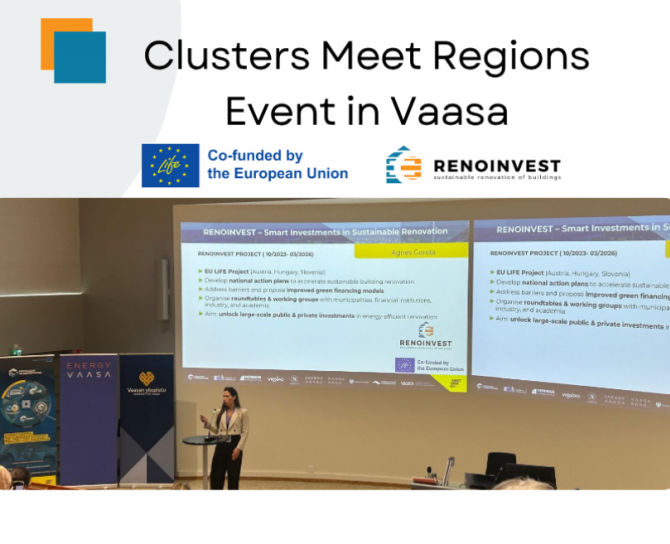
RENOINVEST Showcased at the Clusters Meet Regions Event in Vaasa
The Clusters Meet Regions event, held on 23–24 September 2025 in Vaasa, Finland, brought together experts, policymakers, and innovators from across Europe to explore how regional clusters can strengthen competitiveness, drive sustainability, and enable renewal in a rapidly transforming economic and environmental landscape.
Organized in collaboration with the European Commission (DG GROW), the Region of Ostrobothnia, and the University of Vaasa, the event served as a vibrant platform for sharing best practices and policy perspectives on how Europe’s regions can jointly accelerate the green industrial and renovation transition.
The Vaasa edition focused strongly on energy-efficient construction, digital transformation, and sustainable innovation, highlighting how collaboration between industry, academia, and government can drive resilience in Europe’s built environment.
RENOINVEST – Linking Sustainability, Financing, and Renovation
Representing Hungary, the ArchEnerg Cluster participated actively in the event, presenting the LIFE-RENOINVEST project — a European initiative dedicated to developing green financing models and policy recommendations that enable large-scale, sustainable building renovation.
In the Pitch Session, ArchEnerg showcased its mission to promote renewable energy, energy-efficient construction, and circular economy practices across Central and Eastern Europe.
The presentation emphasized RENOINVEST’s two flagship deliverables:
-
Best Practice Handbook on Sustainable Building Renovations — collecting exemplary renovation and financing models from Austria, Hungary, and Slovenia.
-
Comparative Policy and Market Analysis — mapping regulatory frameworks and investment mechanisms that support sustainable construction and renovation.
Both documents serve as practical guidance for municipalities, SMEs, and investors who aim to integrate energy efficiency and sustainability into the building sector.

Panel Discussion Highlights: “How Can Clusters Build Resilience and Renewal Capabilities?”
One of the central sessions of the event was a high-level panel moderated by Jan Segerstam, Research and Development Director at the University of Vaasa.
The discussion brought together six distinguished speakers representing academia, industry, and European institutions:
Davide Magagna (European Commission – JRC), Pia Karumaa (Danfoss Drives), Kenneth Widell (Wärtsilä), Jitka Vocaskova (DG GROW – European Commission), Mika Grundström (University of Vaasa), and Mats Brandt (Regional Mayor, Ostrobothnia).
Together, they explored how clusters can act as drivers of transformation — connecting people, technologies, and funding sources to make Europe’s sustainability goals achievable.
Investing in Competitiveness and Local Innovation
Opening the session, Davide Magagna emphasized that Europe’s long-term goal must remain competitiveness, which depends on investing in local innovation ecosystems.
He noted that while Europe produces world-class startups, many relocate abroad due to stronger support systems.
To reverse this trend, Magagna argued that Europe must “invest in its own competitiveness” — recognizing the hidden innovation potential of smaller, regional clusters that are often overlooked.
This message resonates deeply with RENOINVEST’s philosophy, which highlights that sustainable renovation ecosystems should not only depend on large national programs, but also on strong local cooperation and financing mechanisms.
The Quadruple Helix – Collaboration as the Core of Innovation
Pia Karumaa from Danfoss Drives expanded the discussion by describing the Quadruple Helix model — cooperation between academia, business, government, and civil society — as the foundation for innovation and social legitimacy.
She noted that “legitimacy and social trust are essential for innovation to take root” and that visibility and storytelling are crucial to create public support for sustainability efforts.
Strengthening Regional Innovation Ecosystems
Kenneth Widell, representing Wärtsilä, called for recognizing smaller and mid-sized regions as innovation leaders.
He explained that true resilience stems from trust, collaboration, and predictable policy environments, not only from funding.
Widell argued that public-private partnerships (PPPs) should remain the cornerstone of innovation in construction and renovation — where public funds de-risk early-stage ideas, while private capital ensures scalability.
His insights highlighted the importance of stable regulatory and financing conditions — a topic RENOINVEST also addresses through its policy recommendations for long-term renovation investment frameworks.
The Social Dimension of Sustainable Renovation
Jitka Vocaskova, Policy Officer at DG GROW, brought a policy perspective to the discussion, stressing that sustainability is not only technological but deeply social and community-based.
“When people see that innovation improves their daily lives — creating quality homes, jobs, and better services — they become advocates of change,” she noted.
Policy Coherence and Sustainable Growth
In conclusion, Mats Brandt, Regional Mayor of Ostrobothnia, emphasized that renewal and sustainability are inseparable.
He highlighted the need for policy coherence, simplified regulations, and improved digital connectivity to support the transition towards greener industries and buildings.
“True resilience means the ability to learn, adapt, and reinvent ourselves when the environment changes,” he said — summarizing the essence of the Vaasa event.
Towards a More Sustainable and Connected Europe
The Clusters Meet Regions – Vaasa Edition clearly demonstrated that Europe’s resilience depends on collaboration across disciplines and borders.
Through initiatives like LIFE-RENOINVEST, these collaborations ensure that Europe’s building stock becomes greener, smarter, and more energy-efficient — supporting not only environmental goals but also economic renewal and social well-being. The RENOINVEST project continues to contribute to this European mission, helping connect policy frameworks, financing tools, and technical knowledge to transform sustainability ambitions into real-world renovation outcomes.
